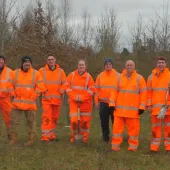Uniquely placed for Net Zero and Net Gain

Mineral Products Association calls for the mineral products industry’s contribution to be recognized
THE mineral products industry has and will continue to play a vital role in delivering Net Zero carbon efficiency and biodiversity Net Gain. In his introductory address at Quarries & Nature 2019 on 23 October, Nigel Jackson, chief executive of the Mineral Products Association (MPA), set out the industry’s action and showcased its achievements, whilst seeking recognition for the role the industry plays in protecting nature. The text of his speech was as follows:
‘These are serious times for far too many species, habitats and our planet.
I know that, MPA knows that, that is why we have not been wasting the last 30 years doing nothing. We have focused on delivering action rather than just adding to too much hot air.
Next year COP 26 is in Glasgow, this will be another important step towards confronting the harsh climate reality we all face. I think it will prove to be the most ‘can do’ yet, I hope so.
The MPA will be actively engaged as best we are able. Sticking to the science, staying practical and proportionate and guided by the evidence. Confronting our responsibilities, highlighting our practical solutions and responses, and playing our part in the collective journey to Net Zero by 2050, I stress by 2050.
Determination and transparency will underpin our approach, not rhetoric, not exaggeration, not denial, not greenwash.
Some say ‘industry is doing nothing about climate change’ or more accurately global warming, or biodiversity loss, our twin and linked challenges, Net Zero and Net Gain.
We are. We have a long and proud legacy when it comes to environmental action and as MPA represents over 90% of the mineral products industry, it means something.
Our Quarry Restoration Awards have been running for 49 years, showcasing hundreds of restored quarry sites all over the UK.
MPA continues to maintain the industry Restoration Guarantee Fund which has been running for over 40 years, an industry pledge that enables local authorities to claim for unfinished restoration of quarries if an MPA producer member goes bust. An unrivalled commitment recognized in planning guidance, a vote of confidence by the industry, in the industry, as no claims have ever needed to be made.
In 1998 we agreed our four-point plan for National Parks with members yielding up old planning permissions, removing the possibility of quarrying in certain areas. That policy is being refreshed in light of prevailing government policy and once the Government has responded to the Glover Review, we will publish it.
In 2005 we formed our partnership with English Nature, now Natural England, to showcase MPA members’ biodiversity achievements.
In 2006 we published our first annual Sustainable Development report; 13 years later we now produce five reports every year evidencing environmental performance in marine aggregates, cement, concrete, industrial lime and all mineral products.
In 2007 we produced our first ‘carbon advice card’ setting out the measures members could take to reduce their carbon footprint, we are currently updating that.
In 2009 we were the first UK industry to launch a Biodiversity strategy. I am not aware that any other industry even has such a strategy.
In 2011 we launched our carbon portal supported by the Carbon Trust giving further guidance on energy and carbon reduction to members.
In 2013 we launched our virtual National Nature Park which now hosts 80 sites restored for wildlife and with public access, field study or education centres, nature trails, many managed by or in liaison with the Wildlife Trusts and RSPB.
In 2015 we launched the first Quarries & Nature event, a two-yearly celebration of the industry’s contribution to nature.
And in 2017 we launched the MPA Charter which sets out our seven Strategic Priorities, of which Climate Change & Energy and the Natural Environment are but two. We also launched our Water Strategy.
And this year we are launching our new Good Neighbour Scheme aimed at building more trust with local communities.
In the first 10 years of the MPA’s life our members have planted 1.5 million trees and 100km of hedgerows. Members have also built 40km of dry-stone walls. They have already created more than 8,000ha of priority habitats with at least another 11,000ha planned.
This year we have published papers evidencing that we are recycling or reusing 82 million tonnes per annum of construction waste either as aggregate or to enable land restoration. The highest use per capita in Europe and, therefore, probably in the world. That is 30% of total aggregate supply, taking the pressure off the need to release primary resources.
So, like countless other scientists and practitioners, we too have been getting stuck in over recent decades, practitioners not preachers.
Unlike some other industries who have a far greater impact on the environment and many who fuel imports exporting their impacts, we pay over £1 billion per annum in environmental taxes. Unlike certain harmful activities we are not subsidized. No public money for our public goods.
Unlike many industries, we are not deforesting at scale to make way for damaging agriculture elsewhere in the world. Unlike many industries, we have reduced our production carbon emissions from cement by 51% since 1990, far better than the UK overall.
Real, measured improvements, not conjectural.
We are strengthening our carbon road map to ensure that notwithstanding the inevitable footprint our production creates, our products in use will counterbalance it over their whole life. If we can get to net zero before 2050, we will.
But we will not join those who arbitrarily nominate unrealistic and opportunist target dates for short term PR gain. This is not a time for empty gestures and virtue signalling. These issues are genuinely complex and not easy to resolve.
Quick easy wins are fine and may make us feel good, but we need to realize that it will take time to transition to sustainable long-term changes at scale. Changing our historical and existing means of production is a massive challenge requiring both innovation and investment, and crucially, time, time we know is precious. Regulation alone will not be enough, incentives to accelerate technological progress will be needed.
We are determined to contribute to achieving Net Zero whilst also creating Net Gain. Net Zero, Net Gain.
All we ask is for is parity of treatment across all business and industry activity using a balanced scorecard approach which links demand and need with supply. No more singling out, everyone subjected to equal scrutiny.
The consumer must also ‘make the link’ between their quality of life and the resources they need to maintain it. Consumers and society drive demand for our products for good reasons. Our products are essential to our quality of life, they enable us to be civilized by being safe, secure, healthy, protected and connected.
Above all, I would say this is not a time to exacerbate divisions. There should be no ‘them and us’, on our treasured planet there can only be ‘us’.
Our industry is as committed to the environment as anyone else. We will continue to work with valued friends and partners to share, listen and learn and rise to the challenges. This long-term industry has not only built a rich legacy of biodiversity assets over the last 50 years, but is itself adapting and preparing for the next 25 years, the next generation, with vigour and resolve and goading ourselves to go further and faster.’









